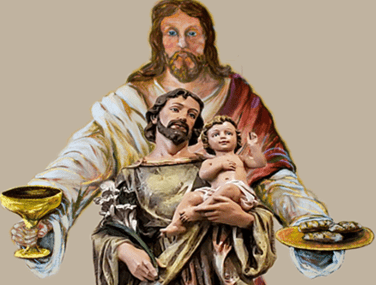Paul starts out strong about the reality at hand. This reality is that nobody can have utterly perfect observance in the law. It is too hard. We are all sinners (Rm 3:23). We have all sinned against God, ourselves and each other. We have already produced a deficiency in our behavior. This is something we cannot overcome or undo. What is done is done. Therefore, we cannot merit anything from God by our actions in themselves. Our only recourse is to beg God for mercy.
But to beg God means to have faith that He can and would save us. In other words, it means that we need faith. Therefore, only when we accept the gift of Faith, the faith God has freely given us, only then can we find the courage to beg for His mercy. Our experience should be that of God’s mercy (v4). This experience of God’s endless grace should give us the confidence of faith, in the balance of humility.
Paul holds Abraham as a model of faith in God (6). Abraham opened his heart and mind to God and in doing so, he entered into a relationship with God. You have faith in people you have a relationship with. So it is with God. How it would hurt a parent when a child does not have faith in their parents. How it hurts God when we choose not to have faith in Him. The Galatians were fooled by believing in the law and mere works. Many of us today get fooled into sports, money, being liked, fear or any other weakness we may have. Like Abraham, when we have faith in God, the works will always follow. The works, as God designed it, is faith that is in action. Faith produces the works. But so many people do not know what that means or what kind of works they are.
Faith allows us to do the works of God himself. Through faith, God enters into our souls and bodies. We become holy temples of God. He fills our minds and hearts with His very self, and so it is God who acts within us (Gal 2:20). Like our relationships with our parents, or any relationship we may have with anybody who wills the good for us; if we do not trust them, we cannot benefit from what they offer. Faith is not a once and for all decision. Like relationships, faith comes and goes. Faith is based on our relationships with the people at hand. Relationships between spouses are constantly changing, hopefully for the better. The way they interact and grow in trust, understanding, patience and forgiveness is the foundation in which their relationship is growing and faith in each other is balanced.
Spouses offend each other and therefore cause each other to doubt the relationship they have with each other. God never does anything wrong and never does any kind of evil towards us. We have every reason to trust him. But when we sin or suffering comes along, we begin to doubt our relationship with Him. When we suffer here below, we learn to trust in God all the more. At least that is what we should be doing. It is our decision on how we react to adversity that defines our relationship with God and our faith in Him. It is a decision we make every day we get up.
When spouses believe in each other and trust each other, they want to do good for each other. Faith in each other allows them to truly love each other in selflessness. This is where works comes in. It is not concerned about the law. It goes beyond the law, that can only condemn. Because faith is so intertwined with the state of relationship one has with the other, it also allows love to be fostered and grow. So faith and love go hand in hand. All said and done, faith inspires the soul to please God.
Abraham was indeed blessed and we are his spiritual children in faith (7). We look forward to receiving all the graces that await us for those who have faith. What a wonderful relationship we have in Christ Jesus as we trust in Him.







